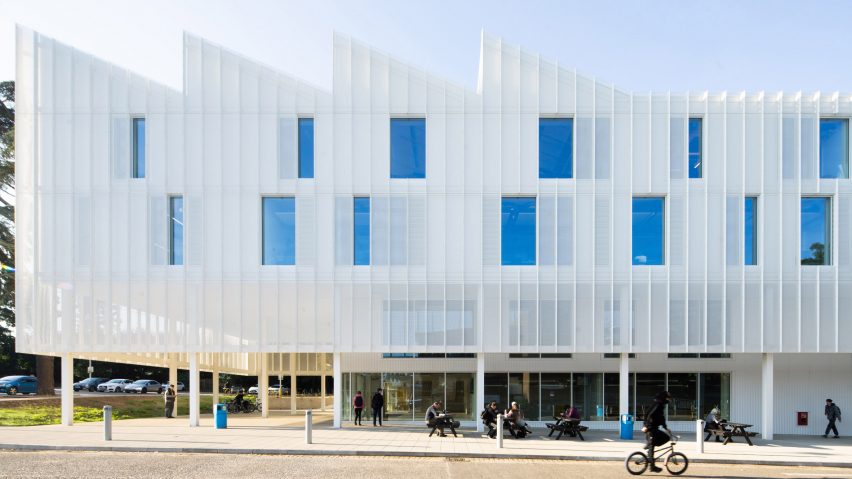White panels made from perforated metal create a feeling of "light and airiness" at this digital-technology education centre, completed by London studio Coffey Architects for City College Norwich in Norfolk.
The 2,877-square-metre Digi-Tech Factory brings together the college's technology, engineering and design courses in one building, with robotics labs, digital studios, classrooms and support spaces.
In the spirit of industrial design, Coffey Architects used off-the-shelf components for the building, including an exposed steel frame, composite panels and glass surrounded by a perforated aluminium shell.
The aluminium shell, which is raised one storey on steel columns and set away from the building's thermal envelope, defines a covered external plaza and terraces around the building.
The terraces lead into a large atrium, which is lit by skylights in the building's sawtooth roof.
Around the atrium are Digi-Tech Factory's teaching spaces, which look out at the surrounding campus through windows that break up the perforated screen. Some windows are covered by panels to create a play of light and shadow in the day and silhouettes at night.
"Light manipulation is a central principle of [our] design practice, often explored, as here, through the use of an external screen to provide light, texture, variation and environmental control," explained the studio.
"In this case the building's panels play with both nature and artificial light depending on the time of day," it continued. "By day, natural light is diffused through the panels into the interior, and by night, light from the spaces within the building activates the facade."
Voids in each floor and full-height internal windows allow light to travel through the atrium and create visual connections between spaces.
"As you move through to the upper floors, the feelings of light and airiness continue despite a small footprint, achieved through a combination of light wells in the roof at each end of the corridors and moments of double-height spaces on each floor," added the studio.
Wide internal corridors, as well as the covered spaces surrounding the building, have been designed to encourage socialising between lessons.
The glazed ground floor extends into a corrugated metal-clad block of labs at the rear of the building, which sinks into and overlooks a gently sloping garden.
Continuing the industrial theme, Digi-Tech Factory's structure and services have been left exposed inside, allowing students and staff to see how the building works while creating flexibility for any future additions or alterations.
The white of the exterior is carried through to the interior steelwork and walls, contrasted by doorways marked out in a vibrant yellow.
Coffey Architects was founded in London in 2005 by architect Phil Coffey. The studio used a similar approach of playing with light and texture at King's Cross, where it designed a three-storey office block clad with perforated aluminium panels.
Neiheiser Argyros also recently used perforated aluminium to enclose the exhaust vents and fire escape of a London Underground station.

